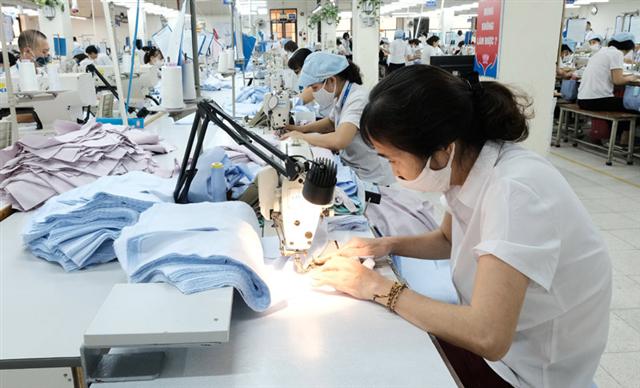SMEs urged to join value chains
SMEs urged to join value chains
Better supplier-buyer relations with multinationals located in Viet Nam would help small- and medium-sized enterprises gain access to electronics global value chains, experts have said.

Duong Thi Kim Lien, deputy director of USAID Viet Nam Linkages for Small- and Medium-d Enterprises (LinkSME) programme, said such relations would help lower costs for multinationals in Viet Nam to source locally, while representing a huge opportunity to grow the country’s SME sector and build its middle class.
Speaking at a workshop held in HCM City on October 4, Lien said the LinkSME programme improves Viet Nam’s regional competitiveness by making it a more predictive investment climate.
Viet Nam has had one of the world’s fastest rates of growth over the past 20 years, but its growth rates have been slowing in recent years, which has raised concerns that Viet Nam may be falling into the middle-income trap, according to Lien.
However, Viet Nam has made raising productivity and increasing value-added production a high priority as part of its plan to modernise and grow its economy.
One way to do this is by strengthening the linkages between domestic firms and global value chains.
The purpose of the LinkSME programme will be to bring about systemic changes in business relationships between Vietnamese SMEs and multinationals in the country.
Nguyen Trong Hieu, an expert with the USAID Governance for Inclusive Growth (GIG) programme, said that 70 per cent of the value of spare parts to make electronics products still comes from imports.
In addition, more than 20 per cent of Vietnamese manufacturers also have financial troubles accessing loans from commercial banks, he said.
Nguyen Thi Xuan Thuy, head of the Industry Department at the Ministry of Industry and Trade, said the ministry would continue to offer preferential policies to foreign investors and encourage domestic supporting industries to help local electronics producers become more involved in global production chains.
Viet Nam has moved up in the global value chain, and has become better known as a manufacturer in Asia, with four industrial sectors participating in the world’s production chains, including electronics, automobiles, agriculture and textiles, she said.
The country, especially the electronics sector, is expected to attract more foreign direct investment (FDI) in the near future, creating more jobs for local workers as well as opportunities for suppliers of electronics.
To better integrate into global electronics value chains, Viet Nam should call for investment from the private sector, and enhance communication systems, market competition and customs clearance procedures.
According to recent World Bank reports, only 300 Vietnamese firms are fully eligible to join the world’s production chains.
Nguyen Quoc Cuong, director of Hanel Plastics, said that SMEs faced hurdles when joining global supply chains because of the unstable quality of products, a problem cited by Samsung and Canon manufacturers in Viet Nam.
Most SMEs do not have a system to ensure quality for all products, he said, adding enterprise leaders lack sufficient commitment and innovation.
“To become a supplier of the first level, enterprises must also ensure standards related to delivery, safety, employee morale, work environment, communications, and technology,” he said.
“The key to success is a long-term strategy with top priority being given to quality of products, skilledl human resource, professional management, and the use of cutting-edge technologies."
In recent years, the electronics industry has grown rapidly and has become one of the most important sectors of Viet Nam’s economy. The growth rate rose from 7.4 per cent in 2011 to 32.5 per cent in 2015.
The development of Viet Nam’s electronics industry is attributed to large investments from multinationals, especially from South Korea and Japan, that manufacture electronic components.
Electronics is the largest export sector in Viet Nam ,with export turnover growing from US$22.9 billion in 2012 to more than $71 billion in 2017.
It is now 2.5 times and five times greater than the textile and footwear sectors, respectively.
Of the total, 95 per cent of the country’s electronics export turnover is due to foreign direct investment (FDI) enterprises.
Organised by the Ministry of Industry and Trade, the workshop was held to help Vietnamese SMEs improve competitiveness and join global value chains.





















